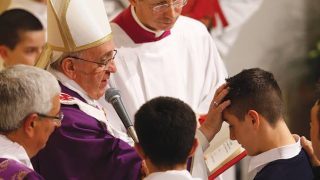
THE CONTROVERSY OF THE HOLY SPIRIT AND SPEAKING IN TONGUES.
HOMILY FOR PENTECOST SUNDAY, YEAR C. Readings: Acts 2:1-11; Psalm 104; Romans 8:8-17; John: 14:15-16.23-26.
Today’s celebration of Pentecost Sunday officially ends the season of Easter and tomorrow we shall continue with the ordinary season. The liturgy presents two accounts of the outpouring of the Holy Spirit upon Mary and the Apostles, which marks the beginning of the Church and the start of her mission to all tongues and peoples and nations. This event and the later controversy is detailed in John’s gospel and Luke’s account (the author of Acts of the Apostles).
Traditionally, the day of Pentecost was a Jewish feast held 50 days after Passover. The first fruit of the wheat harvest presented to God at the Passover is also celebrated this day, and so it is called the day of the first fruits (Nm 28:26), from which we also derive the fruits of the Holy Spirit. It marked the day when the Law was given to Israel. On the Old Testament Day of Pentecost, Israel received the Law; on the New Testament Day of Pentecost however, the Church received the Spirit of love.
This feast is evident in the gospel of today as Christ said, “If you love me, you will keep my commandments. I will ask the Father, and he will give you another Counsellor to be with you forever” (Jn 14:15-16). The fear of abandonment is noticeable in the lives of the disciples. In view of this, God the Son assured them he will pray to God the Father and ask the giving of God the Holy Spirit to the believers to keep his commandments. Christ simply spoke of how the Persons in Trinity interact and work for the good of God’s people and the furtherance of His plan. The Holy Spirit has been present in the life of the Church ab initio, it acts as a teacher and a reminder of all the teachings of Christ: “The Holy Spirit whom the Father will send in my name, he will teach you all things, and bring to your remembrance all that I have said to you” (v. 26). This also has a catechetical dimension as regards the historical controversy leading to the great schism of the 11th century between Roman Catholic and Orthodox Christians, caused by the debate on the clause if the Holy Spirit proceeds from the Father alone or from the Father and the Son as we have in the ‘filioque’ (the Latin form for “from the Son”) as in the Nicene Creed.
While the Orthodox hold unto Jn 15:26 that the Holy Spirit ‘proceeds from the Father alone’, the Roman Catholic agrees with them BUT cannot separate the Father from the Son, holding unto the proper words of Christ in Jn 14:26 “The Holy Spirit, whom the Father will send in my name…” Christ also affirms, “I and the Father are one” (Jn 10:30). Hence, the western expansion of the clause, ‘who proceeds from the Father and the Son’ (filioque), could be justified by the fact that the Son as well as the Father is said to send the Spirit. Put differently, the Holy Spirit proceeds from the Father and the Son.
The first reading fulfills the promise of the Holy Spirit Christ made in the gospel. In it, Luke presents the elements of love and unity among the disciples. They were all together in one place (v.1), known as the Upper Room. The Upper room is quite significant in Christendom for a number of reasons. It is there that Jesus had His last Supper with His Disciples, washed their feet, gave them His commandment of love, and instituted the Holy Eucharist. It is there that the Disciples gathered when the Lord appeared to them, after His Resurrection, and gave them His peace. It is in that room that Jesus gave them power to forgive sins and made them Apostles, by sending them out and it is there that the Holy Spirit came upon Mary and the Apostles and that event witnessed the birthday of the Catholic Church.
There in the upper room, a sound came like a rush of a mighty wind (Hebrew word: ruah), and it filled the entire house where they were sitting. The wind is one of the symbols of the Holy Spirit with a theological synonym of breath, just like the creation story, “God formed man from dust and breathed into His nostrils and man became a living being” (Gn 2:7). Among other symbols of the Holy Spirit are; Dove (like in the baptism of the Lord) and Fire as reflected in today’s celebration (tongues as of fire). In a similar way, just before Christ’s ascension (10 days ago), “He breathed on his disciples saying: receive the Holy Spirit” (Jo 20:22). In Luke’s account of Pentecost, we are told that they were all filled with the Holy Spirit and began to speak in tongues (v.4).
Speaking in tongues has been the focal point of significant controversy in the Church. People still ask the same question these bystanders asked on the day of Pentecost. There is no controversy that God, at least at one time, gave the Church the gift of tongues, but much of the controversy centers on the question, “What is God’s purpose for the gift of tongues?” The gift of tongues is a personal language of prayer given by God, whereby the believer communicates with God beyond the limits of knowledge and understanding (1Cor 14:14-15). It has an important place in the devotional life of the believer, but a small place in the corporate life of the Church (1Cor 14:18-19), especially in public meetings (1Cor. 14:23). The gift of speaking in tongue is not for all believers (1Cor 12:30) so that we do not seek this gift merely to prove to others that we are really filled with the Holy Spirit. This way, it becomes counterfeit.
Let us allow the Holy Spirit to lead us, as Paul in the second reading said, “For all who are led by the Spirit of God are sons of God.” If the Spirit who proceeds from the Father and the Son leads us, our speaking in tongues would be in one language, the language of love. It is in this language we pray: Come Holy Spirit, fill the hearts of thy faithful, and enkindle in us the fire of thy love. May the fire of love burn every hatred and all vices in us. Amen!
Happy Feast of Pentecost!
Fr. Ken Dogbo, OSJ










